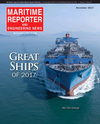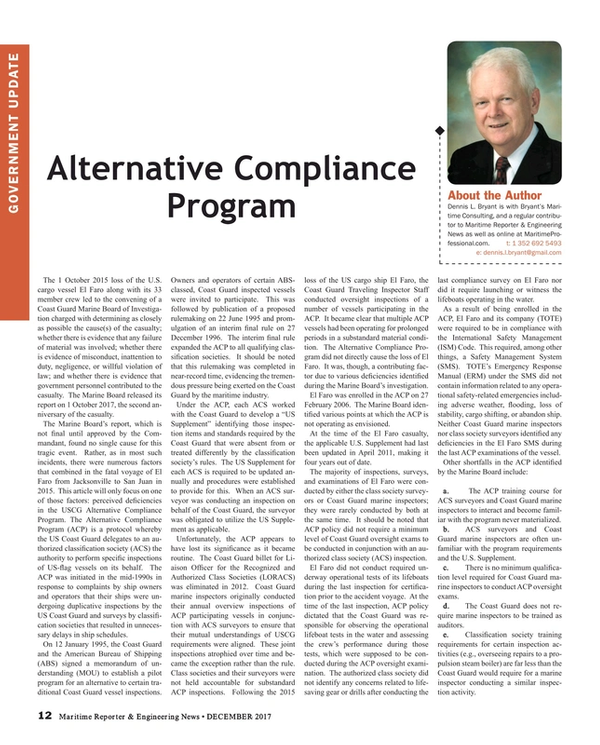The October 1, 2015 loss of the U.S. cargo vessel El Faro along with its 33 member crew led to the convening of a Coast Guard Marine Board of Investigation charged with determining as closely as possible the cause(s) of the casualty; whether there is evidence that any failure of material was involved; whether there is evidence of misconduct, inattention to duty, negligence, or willful violation of law; and whether there is evidence that government personnel contributed to the casualty. The Marine Board released its report on October 1, 2017, the second anniversary of the casualty.
The Marine Board’s report, which is not final
until approved by the Commandant, found no single cause for this tragic event. Rather, as in most such incidents, there were
numerous factors that combined in the fatal voyage of El Faro from Jacksonville to San Juan in 2015. This article will only focus on one of those factors: perceived deficiencies in the USCG Alternative Compliance Program.
The Alternative Compliance Program (ACP) is a protocol whereby the U.S. Coast Guard delegates to an authorized classification society (ACS) the authority to perform specific inspections of U.S.-flag vessels on its behalf. The ACP was initiated in the mid-1990s in response to complaints by ship owners and operators that their ships were undergoing duplicative inspections by the U.S. Coast Guard and surveys by classification societies that resulted in unnecessary delays in ship schedules.
On January 12, 1995, the Coast Guard and the American Bureau of Shipping (ABS) signed a memorandum of understanding (MOU) to establish a pilot program for an alternative to certain traditional Coast Guard vessel inspections. Owners and operators of certain ABS-classed, Coast Guard inspected vessels were invited to participate. This was followed by publication of a proposed rulemaking on June 22, 1995 and promulgation of an interim final rule on December 27, 1996. The interim final rule expanded the ACP to all qualifying classification societies. It should be noted that this rulemaking was completed in near-record time, evidencing the tremendous pressure being exerted on the Coast Guard by the maritime industry.
Under the ACP, each ACS worked with the Coast Guard to develop a “U.S. Supplement” identifying those inspection items and standards required by the Coast Guard that were absent from or treated differently by the classification society’s rules. The U.S. Supplement for each ACS is required to be updated annually and procedures were established to provide for this. When an ACS surveyor was conducting an inspection on behalf of the Coast Guard, the surveyor was obligated to utilize the U.S. Supplement as applicable.
Unfortunately, the ACP appears to have lost its significance as it became routine. The Coast Guard billet for Liaison Officer for the Recognized and Authorized Class Societies (LORACS) was eliminated in 2012. Coast Guard marine inspectors originally conducted their annual overview inspections of ACP participating vessels in conjunction with ACS surveyors to ensure that their mutual understandings of USCG requirements were aligned. These joint inspections atrophied over time and became the exception rather than the rule. Class societies and their surveyors were not held accountable for substandard ACP inspections. Following the
2015 loss of the US cargo ship El Faro, the Coast Guard Traveling Inspector Staff conducted oversight inspections of a number of vessels participating in the ACP. It became clear that multiple ACP vessels had been operating for prolonged periods in a substandard material condition
The Alternative Compliance Program did not directly cause the loss of El Faro. It was, though, a contributing factor due to various deficiencies identified during the Marine Board’s
investigation.
El Faro was enrolled in the ACP on February 27, 2006. The Marine Board identified various points at which the ACP is not operating as envisioned.
At the time of the El Faro casualty, the applicable U.S. Supplement had last been updated in April 2011, making it four years out of date.
The majority of inspections, surveys and examinations of El Faro were conducted by either the class society surveyors or Coast Guard marine inspectors; they were rarely conducted by both at the same time. It should be noted that ACP policy did not require a minimum level of Coast Guard oversight exams to be conducted in conjunction with an authorized class society (ACS) inspection.
El Faro did not conduct required underway operational tests of its lifeboats during the last inspection for certification prior to the accident voyage. At the time of the last inspection, ACP policy dictated that the Coast Guard was responsible for observing the operational lifeboat tests in the water and assessing the crew’s performance during those tests, which were supposed to be conducted during the ACP oversight examination. The authorized class society did not identify any concerns related to lifesaving gear or drills after conducting the last compliance survey on El Faro nor did it require launching or witness the lifeboats operating in the water.
As a result of being enrolled in the ACP, El Faro and its company (TOTE) were required to be in compliance with the International Safety Management (ISM) Code. This required, among other things, a Safety Management System (SMS). TOTE’s Emergency Response Manual (ERM) under the SMS did not contain information related to any operational safety-related emergencies including adverse weather, flooding, loss of stability, cargo shifting, or abandon ship. Neither Coast Guard marine inspectors nor class society surveyors identified any deficiencies in the El Faro SMS during the last ACP examinations of the vessel.
Other shortfalls in the ACP identified by the Marine Board include:
- The ACP training course for ACS surveyors and Coast Guard marine inspectors to interact and become familiar with the program never materialized.
- ACS surveyors and Coast Guard marine inspectors are often unfamiliar with the program requirements and the U.S. Supplement.
- There is no minimum qualification level required for Coast Guard marine inspectors to conduct ACP oversight exams.
- The Coast Guard does not require marine inspectors to be trained as auditors.
- Classification society training requirements for certain inspection activities (e.g., overseeing repairs to a propulsion steam boiler) are far less than the Coast Guard would require for a marine inspector conducting a similar inspection activity.
- ACS surveyors performing ACS inspections are reluctant to hold up a commercial vessel especially for observations that are outside the scope of the classification society survey being performed.
- The ACP does not have a designated lead office or individual at Coast Guard Headquarters.
The Marine Board Report of Investigation (ROI) makes various recommendations with regard to the Alternative Compliance Program including the following:
- Use of U.S. Supplements should be eliminated and ACS surveyors should default to the 46 CFR requirements.
- ACS accountability and transparency should be increased through annual Coast Guard reports of domestic vessel compliance, including certain control actions associated with an ACS.
- Individual ACS surveyors should be vetted by the cognizant Coast Guard Officer in Charge of Marine Inspection (OCMI) for each type of delegated activity being conducted on behalf of the Coast Guard.
- The Coast Guard should develop and add to the curriculum for training marine inspectors an Advanced Journeyman Inspector course covering ACS oversight, auditing responsibilities, and inspection of unique vessel types.
- The Coast Guard should consider creation of a Third Party Oversight National Center of Expertise to conduct comprehensive and targeted oversight activities on all third party organizations and ACSs that perform work on behalf of the Coast Guard.
I think that the Marine Board did an excellent job of analyzing the circumstances surrounding the tragic loss of El Faro. I am also concerned with the various shortcomings in the Alternative Compliance Program identified in the Report of Investigation. I concur with some, but not all, of the Marine Board’s recommendations.
The Alternative Compliance Program clearly needs to be tightened. Improved Coast Guard oversight and accountability is vital. I do not, though, think that the U.S. Supplements should be jettisoned. Classification surveyors are trained to check for conformity with class society rules. They are not intimately familiar with 46 CFR, even though the two systems largely cover the same items. The USCG regulations include numerous cross references that may be lost on the uninitiated. A proper U.S. Supplement developed and approved by the Coast Guard and the ACS and kept up-to-date will be more useful to a surveyor than a set of Coast Guard regulations. While the Coast Guard needs to do a better job of auditing ACS exams and holding class societies accountable, it is unnecessary in my opinion to publicly list such exam deficiencies. The Coast Guard can and should, though, issue warning letters to an ACS found to have a pattern of deficiencies and remove the ACP authorization when appropriate.
The Alternative Compliance Program can provide a valuable service to the marine industry and the Coast Guard, but only if it operates as intended. The El Faro tragedy highlighted certain deficiencies in the program and the Marine Board has made some valuable recommendations for improving the process. It is now up to the Coast Guard and the classification societies to improve the process. The Coast Guard and the class societies recently conducted a summit to address issues identified in the Marine Board report and get this important program back on track.
The Author
Dennis L. Bryant is with Bryant’s Maritime Consulting, and a regular contributor to Maritime Reporter & Engineering News as well as online at MaritimeProfessional.com.
t: 1 352 692 5493



